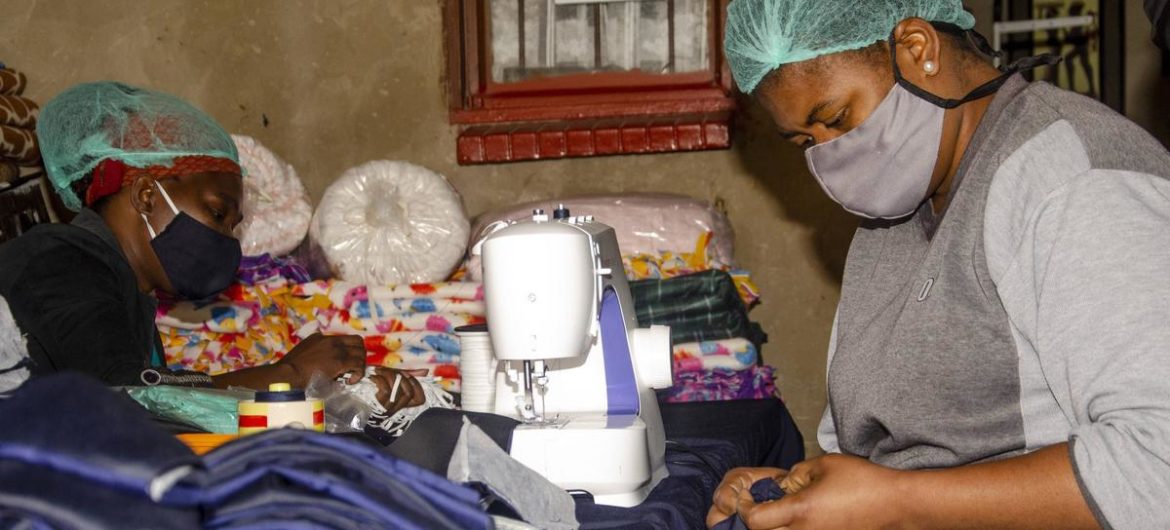When the COVID-19 pandemic threatened Ponani Shikweni’s small business she took it as an opportunity to grow and empower other young women in Alexandra, Johannesburg.
“Life is fast in Alex, and to survive you need to have a plan. Having no income and no job can lead people to some desperate, dangerous actions, and so when we offer young women work opportunities, we are also helping young people to avoid getting involved with drugs and crime,” says Shikweni, who is director of the sewing company Hluvuko Designs.
“These young women were unemployed and had very few opportunities until I recruited them to join our cooperative, and taught them how to sew to earn a living. Then when COVID-19 arrived, suddenly there was a huge demand for cloth face-masks and, fortunately, we were ready to start producing to help fill this gap,” she added.

Before the Hluvuko Designs business was formally established, Shikweni and six other women had started sewing to orders. Their products were being sold through an intermediary and the women therefore received only a fraction of the profits.
In 2015, however, Netcare recognised the potential of the women’s entrepreneurial model as a promising enterprise development project and assisted them to formally register the business. According to Shikweni, the name ‘Hluvuko Designs’, meaning ‘development’, was chosen because it encapsulates their purpose of developing individuals as well as contributing to the prosperity of their community.
Dr Nceba Ndzwayiba, Netcare’s director: transformation, recalls how the women’s sewing cooperative stood out even when it was operating informally.
“Ponani and the Hluvuko Designs ladies impressed us from the start. The simplicity of the model, its potential to directly benefit youth, women and their households, and in particular how their operations could be scaled up to meet demand, demonstrated to us that they would be a good prospect as an enterprise and supplier development partner,” he said.
In addition to assisting the women to register the business, Netcare commissioned the team to sew items including conference bags, pillowcases and kangaroo care wraps. For example, Netcare purchases the wraps, made from high quality repurposed Netcare linen, to insert into the Netcare baby gift bags to assist mothers with skin-to-skin care for their babies.

“With the outbreak of COVID-19 in South Africa, Netcare asked us to make 10 000 cloth facemasks for their staff members and we got another big order for 20 000 facemasks from the Youth Employment Service [YES] initiative and Exemplar, which hands out the masks for free to people shopping at Alex Mall,” Shikweni relates.
“Last year Netcare also arranged training for us on how to run a factory effectively, which has helped us to get more young women working quickly to keep up with demand. It has been going very well with our business, we are getting more orders. We have bought more big sewing machines and we recently bought our own vehicle, which is already making a big difference to our business,” she says.
So far Shikweni’s company has created opportunities for 32 women in Alexandra,19 of them are young.
“Working to put food on the table and support a family gives a young person more confidence, and it’s that kind of confidence that inspired me to create more opportunities for township women,” she said.
Ndzwayiba says that helping to cultivate this social enterprise as part of the Netcare supply chain diversification strategy has been far more fruitful than ever anticipated. “What started as an up-cycling initiative has blossomed into a lasting and mutually rewarding partnership, which shows enormous potential as a sustainable and scalable means of building skills and creating jobs in townships.

“Empowering young women has been demonstrated to yield wider benefits to society as a whole. Women earning an income in Alex are also more likely to spend money locally, invigorating the township economy. Also, as women tend to invest in their children, initiatives such as Hluvuko Designs offer potential for benefitting the next generation and the community at large,” Ndzwayiba notes.
“We have been so inspired by what Hluvuko Designs has achieved thus far. The women have shown perseverance, determination and eagerness to learn, and we have every confidence that they will continue to thrive and grow their business,” he concludes.




